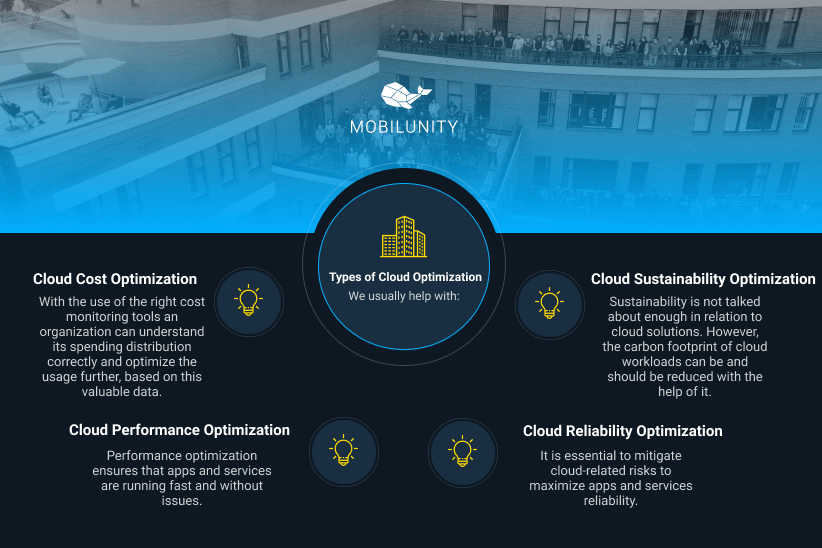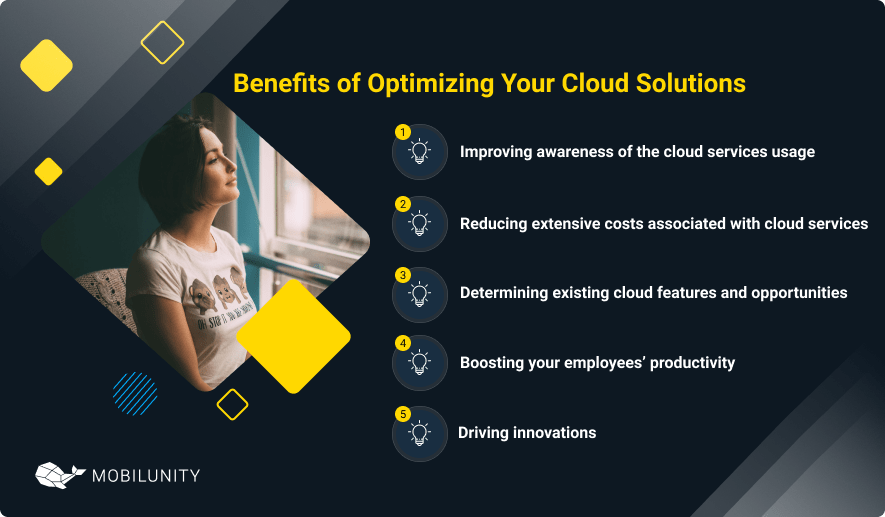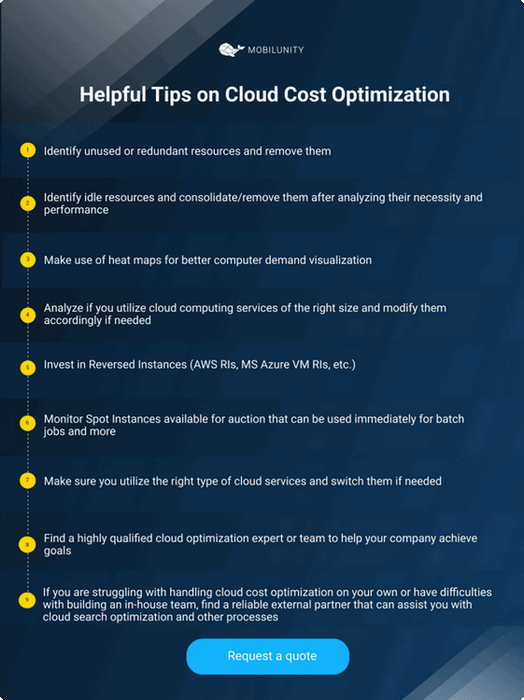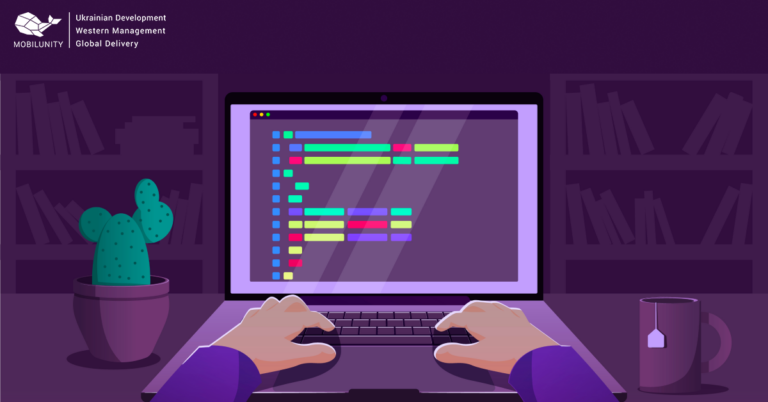Cloud Optimization Services: Cost, Storage, Resources

- The Importance of Cloud Optimization
- Types of Cloud Optimization
- When Can Cloud Optimization Be of Help?
- Benefits of Optimizing Your Cloud Solutions
- How to Achieve Successful Cloud Computing Optimization: Recommendations to Follow
- Helpful Tips on Cloud Cost Optimization
- What Resources Are Needed for Cloud Migration and Optimization?
- Comparing Cloud Optimization DevOps Monthly Rates in Different Countries
- Mobilunity as Your Reliable Cloud Optimization Services Partner
According to Deloitte Insights, cloud solutions have continuous growth, driving companies towards cloud migration and further optimization. In this article, we explore cloud optimization, cloud managed services, and key recommendations for optimizing cloud solutions successfully. To enhance automation and efficiency in these processes, consider hire DevOps engineers.
The Importance of Cloud Optimization
Cloud optimization implies eliminating cloud resources wastage by fine-tuning, sizing, and provisioning the existing solutions. Whether you have just migrated to the cloud or have been using cloud features for some time, cloud optimization is a crucial next step and continuous effort to ensure you get the maximum benefits from cloud solutions and pay for what you need and actually use for your business.
Following DevOps definition, cloud optimization can also be considered as finding the most efficient way to allocate cloud solutions among the company’s use cases. The main goal is to reduce the costs spent on the cloud features, boosting the performance of the organization at the same time.
A well-thought-out cloud-optimizing strategy performed by a well-versed cloud optimization engineer can help you monitor the cloud utilization, increase solutions’ visibility, determine cost-saving opportunities, and get rid of unnecessary functionality to optimize the performance of the cloud services for your organization.
When it comes to optimizing cloud-based services, many businesses tend to work with external partners that provide cloud computing optimization services. Such cooperation allows access to the top-tier experts with extensive cloud-optimizing experience at much lower costs compared to the resources and effort one would need to invest in building such a high-end team in-house from scratch. If you are seeking AWS developers for hire, collaborating with an experienced partner can help streamline your cloud projects while ensuring top-notch quality.
Types of Cloud Optimization
Although many businesses think of the cloud-optimizing activity as a single complex process, it actually has multiple facets and types that may or may not be utilized together, depending on the company’s goals. Let’s take at the main types and driving forces for this optimization in detail:
Cloud Cost Optimization
One of the leading reasons that drive companies is cost optimization cloud. Compared to on-premises solutions, cloud ones are harder to determine in terms of resources spent and the workload required. However, with the use of the right cost monitoring tools (depending on the cloud vendor, i.e., AWS Cost Optimization Monitor, as well as cloud optimization platforms, third-party software, etc.), an organization can understand its spending distribution correctly and optimize the usage further, based on this valuable data.
Cloud Performance Optimization
When it comes to the cloud, performance optimization ensures that apps and services are running fast and without issues. First of all, it is important to design the cloud architecture efficiently. If the architecture is not well-thought-out, it may become a barrier to successful optimization, with optimal cloud architecture that meets the organization’s needs, analyzes the current performance and cloud resources usage, and makes data-driven decisions to benefit the performance.
Cloud Reliability Optimization
Reliability is closely connected to performance, as because of frequent cloud-based workload failures, it won’t be possible to achieve good results. It is essential to mitigate cloud-related risks (whether associated with the selected cloud vendor or the workload itself) to maximize apps and services reliability.
Cloud Sustainability Optimization
Sustainability is not talked about enough in relation to cloud solutions. However, the carbon footprint of cloud workloads can be and should be reduced, and this can be achieved following the same best practices and using the same monitoring and data analytics tools as for other cloud-optimizing types.
Of course, there’s no universal approach to optimizing cloud-based functionality, and the use of the optimization strategies tools and strategies depends on the organization’s goals and priorities. Worth noting, companies with multifaceted goals that do not focus on one cloud-specific optimization type and think big come up with optimal cloud solutions faster and with less hassle.
When Can Cloud Optimization Be of Help?
Let’s sum up how optimizing cloud-based solutions can help a company:
- If you want to improve cloud resources allocation;
- If you want to optimize costs spent on the cloud solutions;
- If you want to improve organization-wide collaboration;
- If you want to boost performance and product quality;
- If you want to achieve cloud storage optimization;
- If you want to optimize existing applications and software;
- If you want to ensure better reliability and security of software;
- If you want to boost IT experts’ productivity;
- If you want to establish clear cloud architecture;
- If you want to enable continuous improvement strategies.
Still doubting how to approach cloud optimization? We know how to make it right >>>
Benefits of Optimizing Your Cloud Solutions
If you want to reap all the benefits of cloud services, it’s not enough to just migrate to the cloud and stay with the new functionality. It is all about continuous improvement and cloud resource optimization. The benefits of the continuous multifaceted optimization include:
- Improving awareness of the cloud services usage (cloud optimization improves cloud visibility and the features used, which helps to discover unused or idle functionality you may be paying for, as well as estimate instances and optimal reverse capability for the business);
- Reducing extensive costs associated with cloud services (the pricing plans are often complex and include a large number of specific features, which makes it hard to pick the ideal plan right from the start, but cloud optimization allows coming up with an optimal plan containing the necessary solutions only based on the data monitored);
- Determining existing cloud features and opportunities (tools change constantly, and there may be a faster and cheaper cloud service/ better alternative to meet your company’s needs now, but you won’t know about it before embarking on cloud optimization);
- Boosting your employees’ productivity (with optimized tools and, thus, fewer distractions, workers will have more time and resources to concentrate on their core responsibilities; developers can concentrate on writing new code; DevOps don’t need to stress and fight endless performance fires);
- Driving innovations (cloud solutions created a new working model and takes efficiency and resources spent on the next level, which allows for less maintenance routine and more productivity and creativity; given that nowadays, innovations are a must for any company to strive, optimizing the cloud services falls under essentials for any business).
How to Achieve Successful Cloud Computing Optimization: Recommendations to Follow
As you see, cloud optimization is not only about optimizing costs and can bring even greater value when handled correctly. Here are our recommendations on how to achieve successful optimization of cloud resources:
Set clear goals and KPIs
The aim is to ensure that cloud services and associated costs correlate to the company’s ideas and values).
See the full picture
To monitor and analyze your cloud usage to determine what services cost you most; track cloud services usage over time; compare the costs invested with returns.
Understand the context
Cloud providers’ general reports may not fully cover your need in the statistics, so it’s worth considering sticking to custom reports or third-party analytics solutions to collect insights, gain full visibility over your cloud usage, and make data-driven decisions on further optimization.
Measure performance
Analyze if the cloud services spending and performance results achieved thanks to the cloud solutions deliver the expected results; identify the strong and weak points; optimize your cloud further and adjust KPIs if needed.
Helpful Tips on Cloud Cost Optimization
Based on Mobilunity experience with implementing container cloud optimization, here are our recommendations on how to save costs when optimizing the cloud:
- Identify unused or redundant resources and remove them;
- Identify idle resources and consolidate/remove them after analyzing their necessity and performance;
- Make use of heat maps for better computer demand visualization;
- Analyze if you utilize cloud computing services of the right size and modify them accordingly if needed;
- Invest in Reversed Instances (AWS RIs, MS Azure VM RIs, etc.);
- Monitor Spot Instances available for auction that can be used immediately for batch jobs and more;
- Make sure you utilize the right type of cloud services and switch them if needed (for instance, public cloud optimization is simpler and quicker compared to multi-cloud solutions);
- Find a highly qualified cloud optimization expert or team to help your company achieve goals;
- If you are struggling with handling cloud cost optimization on your own or have difficulties with building an in-house team, find a reliable external partner that can assist you with cloud search optimization and other processes.
What Resources Are Needed for Cloud Migration and Optimization?
Depending on the cloud computing services of choice (Amazon Web Services, Microsoft Azure, Google Cloud Platform, IBM, etc.), the resources needed may vary. However, a highly qualified DevOps with cloud migration and optimization experience, as well as the necessary cloud services certifications, acts as a basis for effective implementation and cost optimization in cloud computing.
Here are some certifications by the most popular cloud vendors to look for when choosing a DevOps expert of cloud optimization partner to work with:
- Amazon Web Services: AWS Certified DevOps Engineer
- Microsoft Azure: Microsoft Certified: Azure DevOps Engineer Expert
- Google Cloud: Professional Cloud DevOps Engineer
- IBM: Foundations of IBM DevOps V2, IBM Certified Solution Advisor – DevOps V2
- Cisco: Implementing DevOps Solutions and Practices using Cisco Platforms
Comparing Cloud Optimization DevOps Monthly Rates in Different Countries
Notably, the salary rates of cloud optimization DevOps experts vary not only based on their expertise and experience but also on the country of living. Let’s compare the monthly salaries of such specialists in different countries. The table below is based on ZipRecruiter, GlassDoor, Talent.com data, and our recruiting department research over Ukrainian job portals:
| Monthly salary, USD | |
| The USA | $10,418 |
| The UK | $7,480 |
| Switzerland | $10,027 |
| Germany | $6,067 |
| Ukraine | $3,100* |
*Ukrainian salaries are provided based on Mobilunity’s Recruitment Team research on the local job markets. All salaries are net and do not include the service fee (in the case of hiring on a dedicated team model). The salaries are provided for comparison purposes and could not be entirely accurate. Contact us to know the exact cost of hiring a developer corresponding to the required parameters.
As you can see, the salary rates of Ukrainian DevOps experts are significantly lower compared to the costs of hiring the same IT professionals in the US or the UK. That’s why many businesses prefer to work with Ukrainian cloud optimization companies and specialists to get value for the money.
Mobilunity as Your Reliable Cloud Optimization Services Partner
If you are looking for a reputable service provider to help you tackle all the challenges with cloud optimization, here at Mobilunity, you can find highly qualified DevOps experts with the needed qualifications and experience. Clients can also ask Mobilunity to hire solutions architects or hire Golang web developer.
Mobilunity is a Ukraine-based dedicated dev team vendor well-known globally for providing top-tier solutions to various businesses for more than 10 years. Our clients trust Mobilunity with finding the best-matching candidates to meet the needs of the business. No matter the industry-specific requirements’ complexity or hard-to-source experience and certifications, our Recruiting Team knows how to find the right experts to benefit your company.
Following the best industry practices coupled with our own time-tested approaches, we at Mobilunity provide tailored solutions and have a dedicated approach to everything we do. If you are looking for a reliable cloud cost optimization company that can help you with cloud migration and/or optimization processes, contact Mobilunity representatives and get the dedicated resources your company deserves.
Ready to overcome all the challenges with cloud optimization? Find the best assistance with Mobilunity!
Disclaimer: All salaries and prices mentioned within the article are approximate numbers based on the research done by our in-house Marketing Research Team. Please use these numbers as a reference for comparison only. Feel free to use the contact form to inquire on the specific cost of the talent according to your vacancy requirements and chosen model of engagement.






















